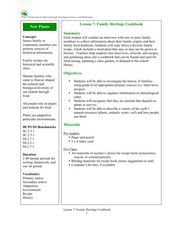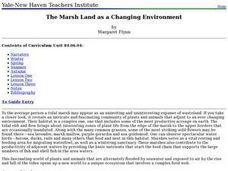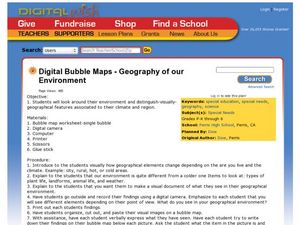Curated OER
Your Day as a Cycle
Fourth graders examine a variety of cycles. They take a look at life cycles of plants and animals, the cycle of the moon and tides, and other sequences of events in their daily lives. An interesting part of the lesson is how kids keep...
Curated OER
How Plants Help Us Breathe
Third graders discuss how humans breathe and how plants help us to stay alive. In groups, they identify and label the different parts of plants and describe their functions. They compare and contrast the ways plants and animals breathe...
Curated OER
Dry-Land Kalo-Growing New Plants from Stems
Students explore Hawaiian plants. In this Hawaii culture and botany lesson, students plant the haha(stem) of a taro plant. Students listen to Hawaiian myths about the taro plant and chorally speak a Hawaiian chant of protection. Students...
Curated OER
Rain Forests: A Disappearing Act?
Learners examine and locate rainforests on maps, and research the patterns of their destruction. They develop a bar graph of rainfall and temperature data, write a journal entry, and research the people, animals, and plants/products of...
Curated OER
Exploring Regions of Our World
Examine how climate and landforms affect plants and animals that live in particular areas. Discover that these same factors affect peoples' homes, jobs, and recreational activities. Pupils research ecosystems and biomes, and then write...
University of New Mexico
New Mexico Land of Enchantment
Third graders research Native American Cultures surrounding New Mexico. They analyze the history and geography of the state. They play a guessing game that incorporates the indigenous plants and animals of New Mexico. In groups, learners...
Curated OER
Enduring Understanding
Fourth graders explore indigenous people of rainforest and examine their customs and ways of life. They discuss how rainforests should be protected not only for their plants and animals, but also for indigenous people who live in them,...
Curated OER
The Chesapeake Bay in Captain John Smith's Time
When Captain John Smith visited the Chesapeake Bay in the summer of 1608, what types of animals and habitats did he encounter? Your young historians will analyze primary source documents to answer this question, as well as compare...
Curated OER
Don't Call Me A Pig
First graders explore wildlife and habitats in the Arizona desert. Throughout a classroom discussion, 1st graders observe pictures of the desert and animals that live there. As they go on a nature walk around the school, students...
Curated OER
Using Venn Diagrams to Compare Two Ecosystems
Students explore the distribution of two ecosystems on a global scale; and map the distribution of tropical and temperate rain forests throughout the world. They use a Venn Diagram to describe these ecosystems and the differences between...
Curated OER
From Yosemite to Joshua Tree
Fourth graders discover diversity of plant and animal life in California's parks and compare findings to identify what makes park areas unique. Students then publish their discoveries in picture books of their own design.
Curated OER
Water Uses and Children's Lives in East Africa
Students explore water usage around the world. In this "water" social studies lesson, students brainstorm ways in which water is used. Students visit the Water in Africa website to view pictures of water usage in...
Curated OER
Protecting the Critical Habitat of the Manatee and the Loggerhead Turtle
First graders research Belize and its landscape and animals on the included internet sites. The students complete activities/centers across the curriculum utilizing the facts they discovered.
Curated OER
Lewis and Clark
Ninth graders study the plants and animals Lewis and Clark discovered on their expedition. There is a plant illustrator, a plant recorder, an animal illustrator, and an animal recorder. They research the plants and animals and the ...
Curated OER
Rain Forest Adventures
Students discover locations of the world's rain forests. Once they identify the animals, plants, products, and resources located in them, they construct they own rain forest terrariums. By comparing and contrasting the two types of...
Curated OER
Changing With the Tide
Students describe three different aspects or life forms of the salt marsh. They compare and contrast the low and high marsh. Students explain what happens in different areas of the marsh at low and high tide; and explain the roles...
Curated OER
Family Heritage Cookbook
Students compare favorite family recipes. In this cultural diversity lesson, students interview family members and record favorite recipes. Students examine cultural diversity through favorite foods.
Curated OER
The Marsh Land as a Changing Environment
Sixth graders continue their examination of the state of Connecticut. After taking a field trip, they identify the types of birds, plants, invertebrates and vertebrates who make their home in the salt marshes. In groups, they identify...
Creative Educator
Design a Rainforest Postcard
Send your class on an expedition through the rainforest! Along the way, they will write informational postcards to demonstrate what they've learned. Each team will be responsible for one of five rainforest regions. When they return from...
Curated OER
The Columbian Exchange
Eleventh graders examine the significant consequences of Spanish exploration and settlement of the New World on animals, humans, and plants. They read and discuss an informational handout, define key vocabulary terms, and complete a...
Curated OER
The Columbian Exchange
Tenth graders examine the consequences of Spanish exploration of the New World on animals, humans, and plants. They read and discuss an informational handout, define key vocabulary terms, and complete a Venn Diagram with Old World and...
Curated OER
Exporing Our Community
Students explore attributes of the community in which they live. They compare rural, urban and suburban communities and attempt to classify their own community. Each group illustrates their assigned area by drawing buildings, trees,...
Curated OER
Geography of Our Environment
Students explore geographical elements. In this geographical elements lesson, students create a map showing the geographical elements in their area. Students take pictures of these elements to glue to their map and present it to the class.
Curated OER
Beaver Ecology
Young scholars explore the lives of bgeahvers. They identify the physical and behavioral adaptations that help beavers survive in their environment. Students compare and contrast how beavers influence the ecology of both forest and...

























